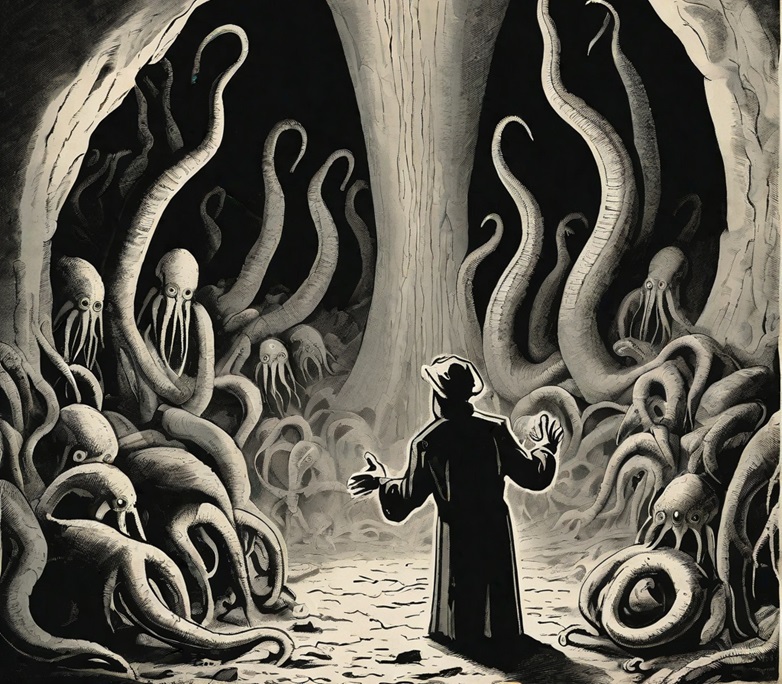What would Christianity look like on a different planet? How can we determine which truths are earthbound, and which are universal?

Imagine you’re a Christian missionary on a planet closer to its sun, where a thin atmosphere does not block harmful solar radiation. People have adapted to the harsh environment by burrowing into the planet’s crust, where it is cool and dark. Like bats, they have developed keen ears and dull eyesight. Inhabitants take trips to the surface at night when poisonous sunburn does not threaten. They grow crops underground, from geothermal energy rather than sunlight. This is the world on which you arrive as a missionary.
When the Light of the World Leaves Them in Darkness
Then, with triumph, you proclaim, “The people walking in darkness have seen a great light. On those walking in the land of deep darkness, a light has dawned!” You tell them of a savior who said, “I am the light of the world. Whoever follows me will never walk in darkness but will have the light of life.” You quote the prophet who said, “Though I sit in darkness, the Lord will be my light.”
And you can’t understand why nobody listens to you. It makes no sense that they reject your message, because you’ve been faithful to the scripture. You’ve told them exactly what they need to hear—after all, these people literally are walking in a land of darkness, and you’ve brought the light of salvation to them. What could be the problem?
Jesus, Lord of Cold and Darkness
The problem is that you’re offering Jesus as the solution to the wrong dilemma. Maybe, just maybe, on this planet, instead of being the Light of the World, Jesus is Lord of Cold and Darkness.
On Earth, such a title would only be suitable for an arch-villain, like C.S. Lewis’ White Witch, Jadis, or the Night King from Game of Thrones. On earth, sunlight is universally good, associated with abundant crops, warm beaches, and summer love. But on this new planet, where people associate light with toxic radiation and broiling heat, it comes across as wrong when you tell them that Jesus is the light. Here, they’d understand better if Jesus were Lord of Cold and Darkness.
Adapting Your Message
If you decided to adapt your message, you could still remain faithful to scripture. You could emphasize Bible passages like, “The Lord is the shade upon my right hand,” or “He descended to the lower, earthly regions,” or “As Jonah was three days and three nights in the whale’s belly: so shall the Son of man be three days and three nights in the heart of the earth.” You might change the metaphors you use. Instead of describing lostness as wandering in darkness, you would describe sin as analogous to struggling through blinding daylight, with the sun’s scorching heat on your back. Jesus, then, as Lord of Cold and Darkness, would offer shelter, shade, and relief from sin’s searing heat. You would be sharing God’s love with people by offering them a dark savior who rescues them from the light.
Increasing Scrutiny
Eventually, once you adapt your message and present Jesus as Lord of Cold and Darkness, you will begin to gain a following. People will understand that God loves them and wants to meet their needs and rescue them from harm. But pretty soon, you will come under increasing scrutiny by the missionary board that sent you to this new planet. They will claim you have abandoned the truth of scripture. They will observe that there are far more verses depicting God as light than there are saying that God will shelter you beneath the shadow of a divine wing.
Faithful to the Light
Soon, more missionaries will arrive, not only to win converts but to oppose your efforts. They will accuse you of twisting scripture by calling good evil, and evil good. Darkness, they say, is universally bad, while light is always good. Light represents divine truth and favor, while darkness depicts rebellion, sin, and confusion. These missionaries will call themselves Light-Bearers. They will hold meetings in brilliantly illuminated halls where converts will squint and strain to see, all the while calling it good. These missionaries will build cathedrals in the open air, where adherents will attend worship and return home with blisters from their scorching sun. Then they will display their welts with pride, displaying them as a sign of their faithfulness to the light.
Not Everything Biblical is True
Meanwhile, your people will gather in grottoes and caves, where they find refuge not only from the damaging sun but also from the persecution of the Light-bearers. These oppositional missionaries will proclaim that their teachings are “biblically correct,” while saying your teachings are “unbiblical.” But you will counter their arguments by noting that not everything biblical is true. Additionally, you will note that on this world, being biblically correct is less important than communicating truth in a culturally relevant way. And so, the debate will continue.
And so it goes today, on this world. One group catches the culture but may step outside of “orthodoxy” to do so. Another insists on faithfulness to biblical literalism while becoming less relevant to everyday society. The more each faction insists it is right, the more it digs in its heels, and the more its potential audience slips through its fingers.
God is Greater Than Metaphor
Because the truth is that Jesus is not the Light. Neither is Jesus the Lord of Cold and Darkness. The Bible describes Jesus as light, as a metaphor. “The Lord is the shade on your right hand” is a metaphor. It’s only when we embrace the mystery of God and admit that God is greater than metaphor, that we will begin to approach the full reality of who God is.
Seek Universal Truth
Religion insists that our group has the correct way, and the other group has it all wrong. Humility and spirituality say that God is present in both light and darkness, in your faith group and in mine. It’s time we stop fighting over symbols, metaphors, and methods. Let’s seek instead that which is universally true, not on this world only. Since God does not change, then we must realize that it’s only our perspectives that shift. We must realize that there are, in fact, ways that we can all know the truth, without fighting over light and shadows.














